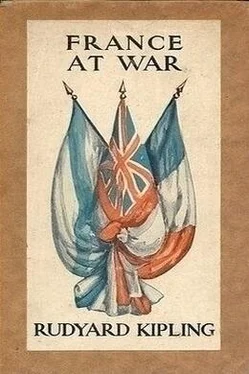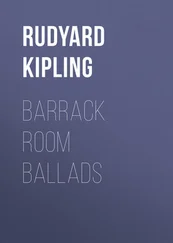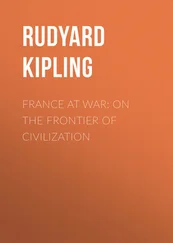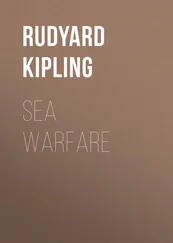Rudyard Kipling - France at War
Здесь есть возможность читать онлайн «Rudyard Kipling - France at War» весь текст электронной книги совершенно бесплатно (целиком полную версию без сокращений). В некоторых случаях можно слушать аудио, скачать через торрент в формате fb2 и присутствует краткое содержание. Год выпуска: 2014, Издательство: epubBooks Classics, Жанр: Биографии и Мемуары, prose_military, на английском языке. Описание произведения, (предисловие) а так же отзывы посетителей доступны на портале библиотеки ЛибКат.
- Название:France at War
- Автор:
- Издательство:epubBooks Classics
- Жанр:
- Год:2014
- ISBN:нет данных
- Рейтинг книги:4 / 5. Голосов: 1
-
Избранное:Добавить в избранное
- Отзывы:
-
Ваша оценка:
- 80
- 1
- 2
- 3
- 4
- 5
France at War: краткое содержание, описание и аннотация
Предлагаем к чтению аннотацию, описание, краткое содержание или предисловие (зависит от того, что написал сам автор книги «France at War»). Если вы не нашли необходимую информацию о книге — напишите в комментариях, мы постараемся отыскать её.
and
.
France at War — читать онлайн бесплатно полную книгу (весь текст) целиком
Ниже представлен текст книги, разбитый по страницам. Система сохранения места последней прочитанной страницы, позволяет с удобством читать онлайн бесплатно книгу «France at War», без необходимости каждый раз заново искать на чём Вы остановились. Поставьте закладку, и сможете в любой момент перейти на страницу, на которой закончили чтение.
Интервал:
Закладка:
HANDY TRENCH–SWEEPERS
I loved that Colonel! He knew his men and he knew the Boches —had them marked down like birds. When he said they were beside dead trees or behind boulders, sure enough there they were! But, as I have said, the dinner–hour is always slack, and even when we came to a place where a section of trench had been bashed open by trench–sweepers, and it was recommended to duck and hurry, nothing much happened. The uncanny thing was the absence of movement in the Boche trenches. Sometimes one imagined that one smelt strange tobacco, or heard a rifle–bolt working after a shot. Otherwise they were as still as pig at noonday.
We held on through the maze, past trench–sweepers of a handy light pattern, with their screw–tailed charge all ready; and a grave or so; and when I came on men who merely stood within easy reach of their rifles, I knew I was in the second line. When they lay frankly at ease in their dug–outs, I knew it was the third. A shot–gun would have sprinkled all three.
"No flat plains," said Alan. "No hunting for gun positions —the hills are full of them—and the trenches close together and commanding each other. You see what a beautiful country it is."
The Colonel confirmed this, but from another point of view. War was his business, as the still woods could testify—but his hobby was his trenches. He had tapped the mountain streams and dug out a laundry where a man could wash his shirt and go up and be killed in it, all in a morning; had drained the trenches till a muddy stretch in them was an offence; and at the bottom of the hill (it looked like a hydropathic establishment on the stage) he had created baths where half a battalion at a time could wash. He never told me how all that country had been fought over as fiercely as Ypres in the West; nor what blood had gone down the valleys before his trenches pushed over the scalped mountain top. No. He sketched out new endeavours in earth and stones and trees for the comfort of his men on that populous mountain.
And there came a priest, who was a sub–lieutenant, out of a wood of snuff–brown shadows and half–veiled trunks. Would it please me to look at a chapel? It was all open to the hillside, most tenderly and devoutly done in rustic work with reedings of peeled branches and panels of moss and thatch—St. Hubert's own shrine. I saw the hunters who passed before it, going to the chase on the far side of the mountain where their game lay.
A BOMBARDED TOWN
Alan carried me off to tea the same evening in a town where he seemed to know everybody. He had spent the afternoon on another mountain top, inspecting gun positions; whereby he had been shelled a little— marmite is the slang for it. There had been no serious marmitage, and he had spotted a Boche position which was marmitable.
"And we may get shelled now," he added, hopefully. "They shell this town whenever they think of it. Perhaps they'll shell us at tea."
It was a quaintly beautiful little place, with its mixture of French and German ideas; its old bridge and gentle–minded river, between the cultivated hills. The sand–bagged cellar doors, the ruined houses, and the holes in the pavement looked as unreal as the violences of a cinema against that soft and simple setting. The people were abroad in the streets, and the little children were playing. A big shell gives notice enough for one to get to shelter, if the shelter is near enough. That appears to be as much as any one expects in the world where one is shelled, and that world has settled down to it. People's lips are a little firmer, the modelling of the brows is a little more pronounced, and, maybe, there is a change in the expression of the eyes; but nothing that a casual afternoon caller need particularly notice.
CASES FOR HOSPITAL
The house where we took tea was the "big house" of the place, old and massive, a treasure house of ancient furniture. It had everything that the moderate heart of man could desire —gardens, garages, outbuildings, and the air of peace that goes with beauty in age. It stood over a high cellarage, and opposite the cellar door was a brand–new blindage of earth packed between timbers. The cellar was a hospital, with its beds and stores, and under the electric light the orderly waited ready for the cases to be carried down out of the streets.
"Yes, they are all civil cases," said he.
They come without much warning—a woman gashed by falling timber; a child with its temple crushed by a flying stone; an urgent amputation case, and so on. One never knows. Bombardment, the Boche text–books say, "is designed to terrify the civil population so that they may put pressure on their politicians to conclude peace." In real life, men are very rarely soothed by the sight of their women being tortured.
We took tea in the hall upstairs, with a propriety and an interchange of compliments that suited the little occasion. There was no attempt to disguise the existence of a bombardment, but it was not allowed to overweigh talk of lighter matters. I know one guest who sat through it as near as might be inarticulate with wonder. But he was English, and when Alan asked him whether he had enjoyed himself, he said: "Oh, yes. Thank you very much."
"Nice people, aren't they?" Alan went on.
"Oh, very nice. And—and such good tea."
He managed to convey a few of his sentiments to Alan after dinner.
"But what else could the people have done?" said he. "They are French."
VI
The Common Task of a Great People
"This is the end of the line," said the Staff Officer, kindest and most patient of chaperons. It buttressed itself on a fortress among hills. Beyond that, the silence was more awful than the mixed noise of business to the westward. In mileage on the map the line must be between four and five hundred miles; in actual trench–work many times that distance. It is too much to see at full length; the mind does not readily break away from the obsession of its entirety or the grip of its detail. One visualizes the thing afterwards as a white–hot gash, worming all across France between intolerable sounds and lights, under ceaseless blasts of whirled dirt. Nor is it any relief to lose oneself among wildernesses of piling, stoning, timbering, concreting, and wire–work, or incalculable quantities of soil thrown up raw to the light and cloaked by the changing seasons—as the unburied dead are cloaked.
Yet there are no words to give the essential simplicity of it. It is the rampart put up by Man against the Beast, precisely as in the Stone Age. If it goes, all that keeps us from the Beast goes with it. One sees this at the front as clearly as one sees the French villages behind the German lines. Sometimes people steal away from them and bring word of what they endure.
Where the rifle and the bayonet serve, men use those tools along the front. Where the knife gives better results, they go in behind the hand–grenades with the naked twelve–inch knife. Each race is supposed to fight in its own way, but this war has passed beyond all the known ways. They say that the Belgians in the north settle accounts with a certain dry passion which has varied very little since their agony began. Some sections of the English line have produced a soft–voiced, rather reserved type, which does its work with its mouth shut. The French carry an edge to their fighting, a precision, and a dreadful knowledge coupled with an insensibility to shock, unlike anything one has imagined of mankind. To be sure, there has never been like provocation, for never since the Aesir went about to bind the Fenris Wolf has all the world united to bind the Beast.
The last I saw of the front was Alan Breck speeding back to his gun–positions among the mountains; and I wondered what delight of what household the lad must have been in the old days.
Читать дальшеИнтервал:
Закладка:
Похожие книги на «France at War»
Представляем Вашему вниманию похожие книги на «France at War» списком для выбора. Мы отобрали схожую по названию и смыслу литературу в надежде предоставить читателям больше вариантов отыскать новые, интересные, ещё непрочитанные произведения.
Обсуждение, отзывы о книге «France at War» и просто собственные мнения читателей. Оставьте ваши комментарии, напишите, что Вы думаете о произведении, его смысле или главных героях. Укажите что конкретно понравилось, а что нет, и почему Вы так считаете.












